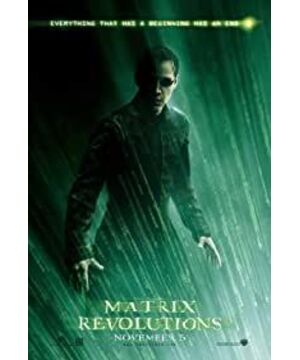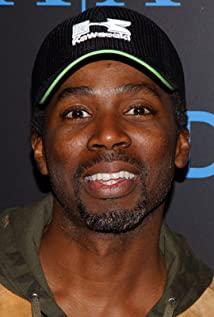This article is a mid-term assignment I wrote for the school's introductory philosophy class. I haven't changed much, so I just took it out and shared it.
Žižek once said that The Matrix is like a Rorschach-tested movie that makes it possible for anyone of any philosophical school to see what they want. It's like a specially made statue of God, no matter which angle you are in the church, you will find his eyes watching you, arousing your thoughts. Wachowski has set a neat trap in this film, allowing all kinds of philosophies like Platonists, Descartes' musings, Buddhism, Gnosticism, and more to justify themselves here. Therefore, today I will start from the critical theory of the Frankfurt School to do some analysis of the Matrix. I have seen Žižek's analysis of "The Matrix", which can not only pierce the inside, but also often jump out of the existing thinking, and lead to a new interpretation of the current situation or old theories through film criticism. As a student, I am not familiar with the history of philosophy because of my lack of knowledge and knowledge, so I can only make superficial articles, and I hope everyone will forgive me.
Criticism of reason and exaltation of individual freedom
If we look at the entire "Matrix" series, then we can see the film's critique of reason and the celebration of individual freedom. In the second part of The Matrix, Neo entered the source data of the entire Martrix and met Architect, the creator of the program. Architect told Neo that the entire Matrix world has had five reincarnations, because the entire Matrix program cannot perfectly simulate the entire human society with tools and rationality. There are always constant accidents and errors, which make the whole system not permanent and stable. run on. And Neo is the sum of all this error, incalculability, uncertainty, and he comes with all of Zion's untamable resistance. All of this is exactly what Architect does, and he condones these discords as a means of refining and upgrading programs, and he even created oracles to help them with the process. When the whole system is on the verge of collapse, Architect will clear all dissonances, including Zion and the old Neo, to achieve a system update. However, although the first five times humans were crushed, this time, Neo won a greater degree of human liberation and peace with machines with human sensibility.
(1) The hegemony of reason
The Matrix in the movie is generated based on computer logic. This computational logic is a representation of rational logic. It must be quantifiable, computable, and completely deterministic, instead of allowing accidental and irrational occurrences. Components, if there are abnormalities and contradictions, it must try to overcome them. As Architect says in the lines, it has to pursue a "mathematical harmony", and despite the small dissonances, Architect is still trying to control all "abnormalities" so that they still can't escape its grasp Heart. We can see that in this movie world, rationality stretches its hegemony everywhere. Regardless of the reaction of Neo at the end of the movie, although it has not exhausted all the mysteries of nature, it has broken through the mystery of the human mind through the restored binary. , the last sacred veil of the free will has been lifted. In the world of Matrix, the binary code is already undeniably "real", and all irrational things can be completely restored by it, because we can clearly see that the world is created according to this. Moreover, this completely rationalized and materialized world can deceive almost all human beings and include it in it. Freedom, autonomy, in this world so desperately we find utterly false.
This hegemony of reason is not entirely irrelevant to our world. Some of the inner logic in a work of art has to be rooted in our real world. The Frankfurt School's discourse on rationality can better outline the evil face of "reason" and describe its evil history for us. The Frankfurt School's ideological pedigree has always condensed a strong criticism of "alienation" and "reification". These critiques are clearly influenced by Marx, whose early members included Olger Lukacs, Karl Korsch, Ernst Bloch were all communists, and the overall framework of critical theory also has Strong Marxist color. Early on they supported radical action, were skeptical of parliamentary reformism, and emphasized the decisive role of class consciousness in overthrowing capitalism. However, in this period they showed a difference from the later Leninist line, they paid attention to the legacy of idealism, and showed an attitude of ignoring the inherent nature of textual orthodoxy or historical materialism. Their investigation of alienation is more inclined to focus on human suffering in an anthropological and existential sense, rather than pure economic exploitation, which is similar to the thinking of young Marx, which is also in line with the positivism in Marxism. , The scientism split lays the groundwork. They inherited their vigilance and critique of instrumental rationality from Nietzsche, Freud, and Max Weber, because the works of the young Marx were not known until 1932, so their critical thoughts on "reification" and "alienation" To a large extent, it also originates from Max Weber's profound insights into "instrumental rationality". With the subsequent rise of Nazi and Soviet totalitarianism, they were completely disillusioned with historical materialism.
After that, they began to attack scientific rationality and positivism. In "Materialism and Metaphysics", Horkheimer criticized positivist materialism and natural science-style analytical social methods that ignored subjectivity and morality. After that, the Dialectics of Enlightenment published in 1947 was an important work or representative work in which they publicly advocated the criticism of scientific rationality, and it was also an important milestone in modern philosophy. In this work there is a more radical new form of critical metaphysics. This work examines how science expelled freedom from the course of history, and how it permeated every aspect of society, even art as a commodity. It criticizes directly at the source of scientific rationality—enlightenment. They vehemently attacked the illusion of progress brought about by the Enlightenment, and slammed the narrative that conflated technological development with progress. Goethe's most beloved oak tree stands in Buchwald's concentration camp, and the massacres that take place in it with the characteristics of modernity are the bright evidence of enlightenment, and the whole bureaucratic machine and instrumental reason are its accomplices.
Although scientific rationality is objective, value-neutral, operable and testable, in the process of enlightenment, they become more violent and arbitrary, and they use "de-enchantment" to squeeze moral self-discipline and the use of conscience out of reason. . Scientific reason is extremely submissive accomplices of capitalism, the bureaucratic state and totalitarianism. Its proponents, in the name of emancipation, ultimately fuel technology-led rationality. They see autonomy and freedom as troubles, and the real purpose of Enlightenment idealism may be regulation and control. In Dialectics of Enlightenment, the protagonist in The Odyssey is willing to give up his identity and name in order to survive, to illustrate that the entire human race has an alienated nature. Therefore, the price that human beings pay for increasing the power over nature is the loss of subjectivity. Totalitarianism emerged on both sides of the political spectrum, liberalism and socialism, in what Horkheimer called a "meeting of the two poles." The iron cage of bureaucracy ends the individual. The Dialectics of Enlightenment isn't even just saying that individuals simply become machines. Rather, it becomes difficult to exercise conscience. Every "I'm just obeying order" "banal evil" ends up being a world-shattering evil. This accusation is not divisive, but points out that liberalism, universalism and other enlightenment heritages are in this same logic, they are like Smith in the movie, they assimilate everything and do not allow the existence of "non-identity".
(2) The exaltation of freedom
Although the machine in the "Matrix" movie has achieved total control over people. Reason is already fully capable of manipulating human nature, and freedom is just a false tool to be manipulated by it. But we can also see in the movie that the perspective of the movie is not a complete pessimism, it still leans towards the humanitarian and humanistic side. In the plot we watched, Neo, with the human spirit that he assumed, was not completely overwhelmed by objectification and rationality in the end. When Smith and Neo were in a decisive battle, they roared at Smith, "Whether it is freedom or truth, or peace or love, it's all illusion, it's all illusion, it's nothing but an excuse for the existence of things that have no meaning and purpose cobbled together by the intellect beneath human beings. . . . All of this is like a matrix, fake!", but Smith didn't end up assimilating Neo either. The film still honors human irrational spirits such as "freedom" and "love", giving them the power to ultimately preserve the entire human community. This shows the utopian spirit that we humans are unwilling to give up.
This reflects how we currently think about things like freedom, sensibility, etc. Although many determinists continue to question the existence of free will, and scientific rationality continues to erode our ideas, sometimes we still have even transcendental beliefs in freedom, especially in perceptual beauty. The Frankfurt School focuses on highlighting and emphasizing this point. This brings us some solace. They always build their theories on the principle of true liberation and the freedom of each individual, they praise utopia and despise those ugly political actions that sacrifice humanity and freedom for the sake of utopia. Therefore, they are wary of simplistic practical actions and seem to lack positive achievements, but they always maintain a posture of criticism and rejection.
The Frankfurt School has been actively seeking new critiques ever since the open split in the traditional Marxist path. Emotional experiences are seen by them as a source of resistance and liberation. Benjamin and Adorno showed their fascination with modernist art in the 1930s. Montage, stream of consciousness, epiphany, and the liberation of the unconscious are valued and promoted by them. The spirit of transcendence is called by them in the vulgarity of everyday experience. Benjamin's Theses on the Philosophy of History incorporated the revolutionary promise of Marxism into the framework of theological terminology. Love and self-actualization play a more profound role in Fromm's later work. New sensibility is advocated by them. They associate philosophical resistance with aesthetics, art, and religion, and religion, art, and philosophy have all become their means of expressing truth.
They have always adhered to the idea of utopia. Ernst Bloch emphasized this idea. He pointed out the importance of utopian thinking in the course of human history. Marcuse's Eros and Civilization agrees. With the help of some of Freud's ideas and Schiller's spirit, he expounds the suppressed desire for liberation, hope and attempts to imagine since ancient times. He hopes to use these ideas to fight against a world of increasing scarcity. He deals with the repressive values of the continuous repetition of principles imposed by individuals living in advanced industrial societies. And Utopia is the denial of all this. It presents a sublimated form of creative activity, combining subject and object and releasing libido. Although there is much to be questioned about the utopian spirit. But it provides each individual with a timeless ideal. The various ideas of the Frankfurt School can give the film's celebration of freedom and human sensibility deep support. They also inspire each of us with their ideas.
Matrix's cultural industry metaphor
In the world of The Matrix, the Matrix forms a hallucination that immerses everyone in an unrecognizable world, and it uses each of them to support its own existence. This can be used as a metaphor for what the Frankfurt School considers the industry of culture. It acts as the capital of the concrete symbol of alienation, taking over and manipulating the daily life of everyone, using each of us as its source of energy and strengthening its domination.
In the world of the Matrix, it provides everyone with ordinary happiness, covers the desolation of the real world, and hunts down and destroys the awakened and rebellious people. The mediocre happiness in the film is consistent with what the Frankfurt School criticized, because the world in the Matrix is the same as the real world, both in the social conditions of the late capitalist world. The happiness instilled in the film makes people lose their autonomy and does not allow people to resist. This is just as the Frankfurt School said that the contemporary culture industry deprives people of their subjectivity and autonomy, that is, the individual's willingness and ability to resist external forces that try to determine the meaning and experience of life. Marcuse believes that people seem to have choices, but they are actually manipulated, which is similar to the Matrix.
First, this manipulation comes from the cultural realm. The Frankfurt School generally believes that the modern cultural industry, that is, the mass cultural industry, is an essential feature of a fully regulated society, an accomplice of objectification. They fear that in the realm of popular culture, art and cultural products will become vulgar and lose their radicality. Their view of culture is not that of conservatives like Edmund Burke, but a baton from Nietzsche, who feared that a worsening vulgarity would erode the high-artistic spirit of activism. Popular culture is increasingly receptive to tradition and authority as its commercialization standardizes traditional experience, and keeps people away from seeking real change. Just like the Matrix makes people like Trevor very happy to immerse themselves in the sensuality of electrical signals, even betraying rebels.
Adorno and Horkheimer accuse mass culture of being homogenous and predictable because of its commodity-producing features, citing many examples, including music, movies, and more. Thus empty, poor and uncreative. They consume or compensate for their surplus energy in a vulgar sense of well-being so that they can reproduce better as labor. Its core attitude is expressed in the Dialectics of Enlightenment:
"Life in late capitalism was a continuous rite of passage. Everyone had to prove that they fully agreed with the right to discipline him. This is also found in jazz's slicing principle, which mocks ups and downs while simultaneously Take it as the norm. Whatever the system wants, the muted voice of a bass singer on the radio, the diligent suitor of a hostess in a tuxedo falling into the pool, is a role model for those who must submit. Every man can be like this omnipotent society; every man can be happy, so long as he fully submits and sacrifices his claim to happiness. [①] ”
Even those fine arts are not immune. Classical music is used as background music for movies, commercials. The iconoclastic avant-garde enters the museum and becomes docile under the peaceful gaze of people. They point out the problem with this - the medium is the message. The form of dissemination of mass culture makes any work, whatever its content, reduced to the free expression of an affluent society.
They also proposed the "oppressive tolerance" of advanced industrial society. Marcuse follows the concept of "the medium is the message". It is pointed out that although the cultural industry is now tolerant, it has made the truth relativistic, not only making art and aesthetics a matter of taste, but also making the speech of political discourse become lax. The two take the form of commodity production, and the qualitative difference becomes only a quantitative difference. When it comes to talking about imperialism and war or attacking the welfare state and creationism, there is no right or wrong opinion, they are just a freely expressed opinion in the mass media. At this time, the real criticism is submerged in the flood of information.
The insights of the Frankfurt School actually intensified with the expansion of consumer society and global capitalism after the 1980s. The resulting landscape of global capitalism, or consumerism, is inescapable, and any force of resistance is under its control. It was said in the film that the first generation of the Matrix used to be a heavenly world where everyone was completely happy, but this world collapsed due to human disbelief, so they deliberately designed a surface to condone the existence of these rebels, But in reality it is a more sophisticated and fully controlled rule. This is just like the characteristics of the cultural industry established by the consumer society. Whether it is the radical artistic proposition of the Frankfurt School or the vigorous counter-cultural movement of the 1960s, they all strongly resist the consumer society, but in the end, they are all self-adjusted by the cultural industry and the consumer society into commercial logic, which further strengthens the consumer society. So that the countercultural movement has become an important accomplice to the further establishment of the consumer society. Advocating a rebellious personality ultimately just makes the rebellious personality a more unique consumer product. As the example cited in Rebel Nation puts it, "They criticize 'sweatshops' and chicken farms for bad conditions, but if consumers are willing to pay more for shoes made by happy workers - or happiness Happy hens lay eggs - then there is money to be made to bring these products to market. This is a business model that has been successfully used by The Body Shop, Starbucks, and others. [②] "All these show Out of a consumerist society like Matrix has an unbreakable control mechanism.
Epilogue
To sum up, we have drawn some points of the Frankfurt School based on The Matrix. Although it is not entirely based on the theory of the Frankfurt School to analyze the film, it seems that a lot of content is outside the film, but my purpose is to introduce some ideas of the Frankfurt School to make the outline of some concepts expressed in the film more clear. clear. This allows us to more thoroughly understand the philosophical logic or historical logic of these concepts. Because the theories of the Frankfurt School are highly realistic and political, when they describe their theories more, they can also make the film more relevant to our current society, and experience some of the ideas conveyed in the film. Give each of us stronger reflection and critical thinking when the historical logic is realized. Although all the ideas of the Frankfurt School are not necessarily correct, many of their theories are controversial, and their overly negative attitude is also very limited. There appears to be no material reference to the preoccupation with abstract issues, and some people take a negative attitude even when the action is actually taking place. This makes them seem incompetent to some extent. But the critical vision that comes from Socrates should always accompany us, that is, the constant examination of existing beliefs and the reflection on the possibility of transcending the established order. Their ideological struggle has profoundly affected social thought and the appearance of today's world. The rise of environmentalism, animal rights, and feminism, and changes in ideas about sexuality and race, are inseparable from their thinking. At present, democracy has not yet been completed, materialization and alienation are still ongoing, autonomy and subjectivity are facing this new danger of erosion along with the trend of network informatization, and consumerism and cultural industry have also combined with these to form a new form of control. Their thinking is still an inescapable intellectual resource for us to observe today's society. And we move forward with new thinking along the cracks they illuminate. As Stephen Eric Bronner concluded in his book "Critical Theory", which introduced the Frankfurt School, "Critical theory can only once again show its uniqueness when confronted with the world with a multifaceted program of change. and the importance of a vibrant ideal: unity, resistance and freedom. [③] ”
[①] [Germany] Max Horkheimer, Theodore Andorno, "The Dialectics of Enlightenment - Fragments of Philosophy", translated by Qu Jingdong and Cao Weidong, Shanghai People's Publishing House, 2006 edition, p. 139
[②] [Canada] Joseph Heath, Andrew Porter, "Rebel Nation: Why Counterculture Becomes Consumer Culture"
[③] [United States] Stephen Eric Bronner: Critical Theory, translated by Sun Chenxu, Nanjing, Yilin Press, May 2019, p. 104
View more about The Matrix Revolutions reviews











